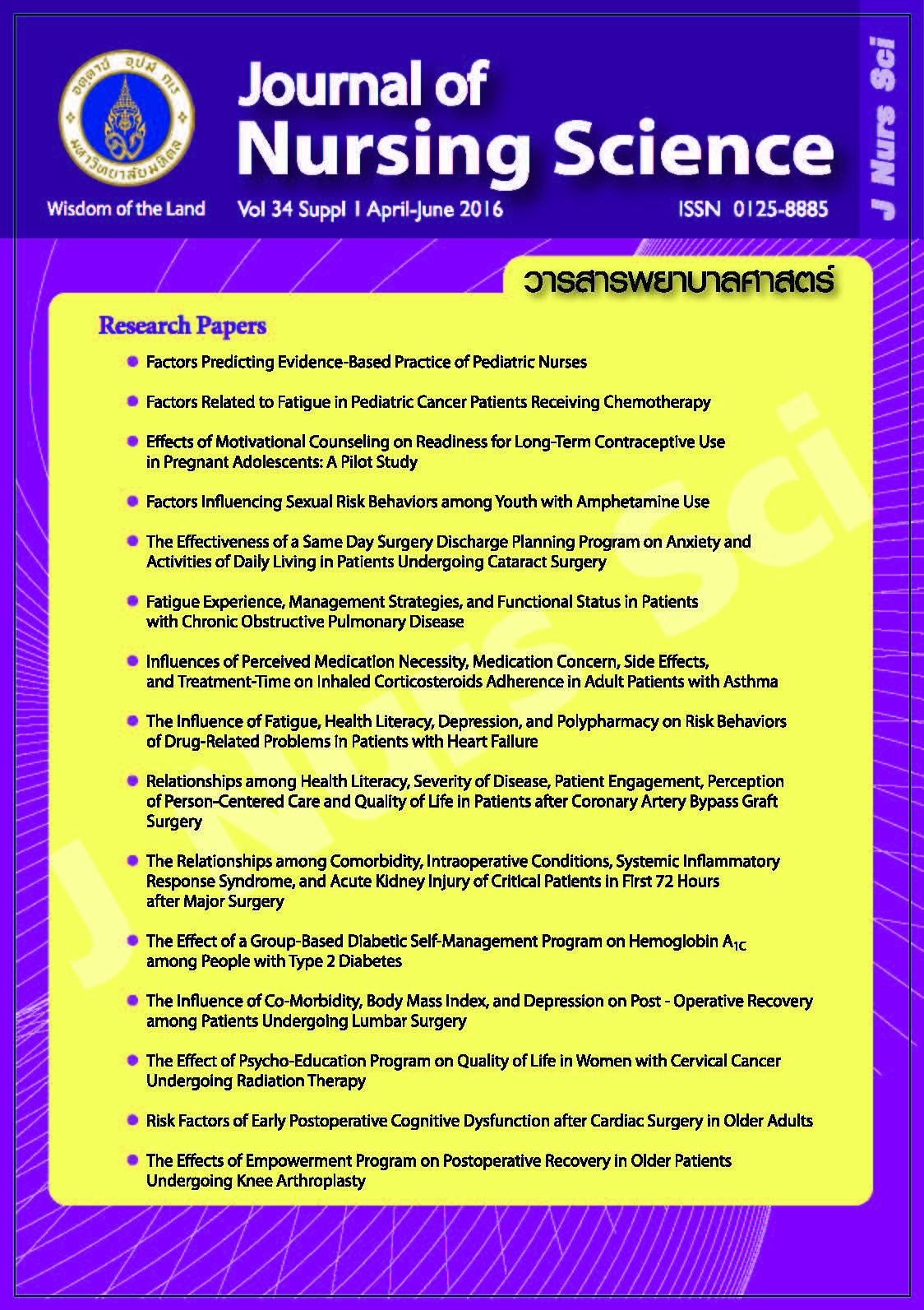The Effect of Psycho-Education Program on Quality of Life in Women with Cervical Cancer Undergoing Radiation Therapy
Main Article Content
Abstract
Abstract
Purpose: To examine the effect of a 5-week Health Promotion Psycho-Education Program (HPPP) on the quality of life of women with cervical cancer undergoing radiation therapy.
Design: quasi-experimental research.
Methods: The sample consisted of 52 women newly diagnosed with cervical cancer who were receiving radiation therapy; 27 subjects were assigned to the experimental group and 25 to the control group. The experimental group received the HPPP program 5 weeks which included group-based teaching and psycho-supportive groups, individual counseling, and telephone coaching with the manual, while the control group received only the manual. Data were collected using FACT-Cx Thai
version at week 1 before program implementation, and after completion of the program at week 5 on the last day of radiation therapy. Data were analyzed by descriptive statistics and ANCOVA using pre-test QOL as a covariate.
Main findings: The results revealed that after completing the HPPP at the end of week 5, the experimental group had higher FACT-Cx scores (M = 150.33, SD = 4.89) than the control group (M = 130.84, SD = 5.78) with statistical significance (F = 168.86, df = 1, p < .05).
Conclusion and recommendations: This finding suggested that the HPPP could be an efficacious intervention for improving quality of life through adopting health-promoting behaviors. Nurses should pay attention to the HPPP implementation in women with cervical cancer for
improving their quality of life during cancer treatment. A follow-up study with long-term monitoring on health promoting behaviour and QOL is recommended.
ผลของโปรแกรมให้ความรู้และประคับประคองจิตใจต่อคุณภาพชีวิตในสตรีมะเร็งปากมดลูกที่ได้รับรังสีรักษา
บทคัดย่อ
วัตถุประสงค์: เพื่อศึกษาผลของโปรแกรมให้ความรู้และประคับประคองจิตใจมุ่งเน้นการสร้างเสริมสุขภาพต่อคุณภาพชีวิตในสตรีมะเร็งปากมดลูกที่ได้รับรังสีรักษา
รูปแบบการวิจัย: การวิจัยแบบกึ่งทดลอง
วิธีดำเนินการวิจัย: กลุ่มตัวอย่างเป็นสตรีมะเร็งปากมดลูกจำนวน 52 คน ที่มารับการรักษาด้วยการฉายรังสี ได้รับการจัดเข้ากลุ่มทดลอง 27 คนและกลุ่มควบคุม 25 คน โดยกลุ่มทดลองได้รับโปรแกรมให้ความรู้และประคับประคองจิตใจมุ่งเน้นการสร้างเสริมสุขภาพ ระยะเวลา 5 สัปดาห์ ประกอบด้วย การสอนแบบกลุ่ม การเข้ากลุ่มประคับประคองด้านจิตใจ การให้คำปรึกษารายบุคคล คู่มือ และการให้คำแนะนำและกระตุ้นการปฏิบัติพฤติกรรมทางโทรศัพท์ ขณะที่
กลุ่มควบคุมได้รับเฉพาะคู่มือเพื่อศึกษาด้วยตนเอง โดยทั้งสองกลุ่มได้รับการพยาบาลตามปกติ เครื่องมือที่ใช้ในการเก็บรวบรวมข้อมูล ได้แก่ แบบประเมินคุณภาพชีวิตสำหรับผู้ป่วยมะเร็งปากมดลูกโดยประเมินก่อนเริ่มโปรแกรมสัปดาห์ที่ 1 และสัปดาห์ที่ 5 วันสุดท้ายของรังสีรักษาวิเคราะห์ข้อมูล โดยใช้สถิติพรรณนาทดสอบค่าที และวิเคราะห์ความแปรปรวนร่วม
ผลการวิจัย: ภายหลังได้รับโปรแกรมให้ความรู้และประคับประคองจิตใจโดยมุ่งเน้นการสร้างเสริมสุขภาพ 5 สัปดาห์ พบว่าค่าเฉลี่ยของคะแนนคุณภาพชีวิตกลุ่มทดลอง (M = 150.33, SD = 4.89) สูงกว่ากลุ่มควบคุม (M = 130.84, SD = 5.78) อย่างมีนัยสำคัญทางสถิติ (F = 168.86, df = 1, p < . 05)
สรุป และข้อเสนอแนะ: ผลการศึกษาชี้แนะว่าโปรแกรมให้ความรู้และประคับประคองจิตใจมุ่งเน้นการสร้างเสริมสุขภาพมีประสิทธิผลต่อการเพิ่มคุณภาพชีวิต พยาบาลควรมุ่งให้ความสนใจนำโปรแกรมดังกล่าวมาใช้เพื่อส่งเสริมการมีคุณภาพชีวิตที่ดีของผู้ป่วยมะเร็งปากมดลูกระหว่างการรักษา ทั้งนี้ควรมีการศึกษาต่อโดยติดตามผลในระยะยาว
คำสำคัญ: โปรแกรมให้ความรู้และประคับประคองจิตใจ การสร้างเสริมสุขภาพ คุณภาพชีวิต มะเร็งปากมดลูก รังสีรักษา
Article Details
Copyright Notice: Nursing Science Journal of Thailand has exclusive rights to publish and distribute the manuscript and all contents therein. Without the journal’s permission, the dissemination of the manuscript in another journal or online, and the reproduction of the manuscript for non-educational purpose are prohibited.

Disclaimer: The opinion expressed and figures provided in this journal, NSJT, are the sole responsibility of the authors. The editorial board bears no responsibility in this regard.


